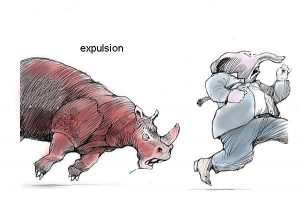-
The Revised Uniform Limited Liability Company Act adopted in New Jersey permits a court to expel a member of a limited liability company when it is not reasonably practicable for the company to continue with that individual as a member.
-
Expulsion, known as involuntary dissociation, based on the not reasonably practicable standard requires a showing that there is a structural impediment to the members continuing in business together, such as deadlock.
-
When the company is able to make decisions and pursue its business purpose, the not reasonably practicable standard does not exist, whatever the level of animosity among the members.
Articles Posted in Dissociation | Explusion
Parties to Arbitrate MD Expulsion
 The subject of the Appellate Division’s recent decision in Ames v. Premier Surgical, LLC, Docket No. A-1278-15T1 (June 29, 2026) is who decides whether a dispute is subject to mandatory arbitration. But the nature of dispute here suggests a cautionary tale about withdrawal and valuation, and what happens when the exit rules from a business don’t have clear valuation provision accepted by all as fair.
The subject of the Appellate Division’s recent decision in Ames v. Premier Surgical, LLC, Docket No. A-1278-15T1 (June 29, 2026) is who decides whether a dispute is subject to mandatory arbitration. But the nature of dispute here suggests a cautionary tale about withdrawal and valuation, and what happens when the exit rules from a business don’t have clear valuation provision accepted by all as fair.
Limited Liability Company Valuation Dispute Triggered by Member Departure
The direction that you’re headed at the time certainly determines the parties’ perspective in business divorce and succession cases. Here the office to buy a retired surgeon’s shares was just 2.5 percent of his demand, and only about 13 percent of what the membership units cost 15 years earlier.
Supreme Court Will Decide LLC Expulsion Dispute
The New Jersey Supreme Court will consider the standards for expulsion of a member from a limited liability company. The Court granted certification in IE Test, LL C v. Carroll, Docket NO. A-6159-12T4 (N.J. Super. App. Div., March 17, 2015)(see our discussion here.) The opinion construes N.J.S.A. 42:2B-24(b)(3)(a) of the now repealed Limited Liability Company Act.
C v. Carroll, Docket NO. A-6159-12T4 (N.J. Super. App. Div., March 17, 2015)(see our discussion here.) The opinion construes N.J.S.A. 42:2B-24(b)(3)(a) of the now repealed Limited Liability Company Act.
The language, however, is nearly identical to that found in New Jersey’s current LLC law, the Revised Uniform Limited Liability Company Act (RULLCA) N.J.S.A. 42:2C-46(e)(3), which governs the involuntary dissociation of members. Here the court affirmed the expulsion of the defendant based on the impracticability of the business continuing with him as member. the now-repealed Limited Liability Company Act.
Seven-Factor Test Applied to Expulsion
Expelled LLC Members: No Right to Force Purchase
Removal of LLC Member May Be ‘Prospective’ Conduct
In what is probably the most significant appellate decision involving New Jersey limited liability companies in a decade, the Appellate Division held that wrongful conduct is not required to expel a member from the LLC, nor is the member entitled to be paid for the value of the interests.
On the contrary, the opinion in All Saints University of Medicine Aruba v. Chilana, Docket No. A-2628-09T1, App. Div Dec. 24, 2012, makes clear the standard can be much lower: conduct that makes it not reasonably practicable to continue the business with the member. The former member, moreover, cannot compel purchase of their interests. They are relegated to the status of assignee, forfeiting all of their management rights but still retaining their financial interest in the business.
Removal of Members in Business Divorce Cases
Expelling a member from a New Jersey limited liability company requires a judicial order, unless the LLC’s operating agreement contains specific provisions that permit for the expulsion of members. Litigation over the expulsion of members, referred to in the New Jersey Limited Liability Company Act as involuntary dissociation, typically focuses on wrongful conduct by the member whose ouster is sought.
Court Permits LLC Removal Without Wrongful Conduct
Landmark Decision Will Make Removal of Members Eaiser
 Many limited liability company litigators have presumed that to expel a member from a New Jersey limited liability company you must establish wrongful conduct such as dishonesty or involement in a a competing business. And moreover, if the case is successful, the next assumption was that the company must buy back the interest of the ousted member
Many limited liability company litigators have presumed that to expel a member from a New Jersey limited liability company you must establish wrongful conduct such as dishonesty or involement in a a competing business. And moreover, if the case is successful, the next assumption was that the company must buy back the interest of the ousted member
Both the trial court and the attorneys involved in All Saints University of Medicine Aruba v. Chilana, Docket No. A-2628-09T1, App. Div Dec. 24, 2012 (read decision below), seem to have made the same assumptions. The appellate court, however, in this recent decision made clear that neither is accurate.
Limited Liability Company Act Permits Expulsion Through Involuntary Dissociation
Similar situations actually arise with some frequency. One of the members of an LLC, for whatever reason, becomes a hindrance to the continued operations of the business. Perhaps the LLC needs capital and the member will not, or cannot, contribute their fair share. Perhaps the LLC relies on the members working in the business on a daily basis and one of them stops coming to work. (Editor’s note: The Supreme Court has drawn portions of the reasoning of the Apellate Division into question in its 2016 decisions in IE Test v. Kenneth Carroll. Read our coverage of the decision here.)
Judges and Lawyers: FB Friends?
Is it ok for lawyers to have FaceBook friends who are judges? Francis Pileggi, a Delaware corporate litigator writes about a recent Ohio professional ethics opinion that says it’s alright that FB friends are different than real friends, which is sometimes true and sometimes not. (Blog Post here)
Lawyers Use FB to Argue
The problem is that it assumes that FB is used by the lawyer only for personal matters and fails to consider just how much influence someone might wield from their posts. I wouldn’t want my adversary posting matters relevant to my case so that they can be read by the judge, nor would I want him or her to use FB posts to build credibility.
Limited Liability Company Subject to Claims By Former Managers Holding Membership Interests
I often find myself counseling caution to business owners that want to use equity to reward or attract key employees. The reason, quite simply, is that if the relationship sours, the employee not only has to be fired but you then have to deal — at best — with a disgruntled former employee as owner or, more likely, he or she likely will have to be bought out.
It’s Not Easy to Fire the Owner-Employee
To get a sense of how difficult these circumstances can be, let’s look at Ross Holding and Management Co. v. Advance Realty Group (Ross Holding v. Advance Realty (Del).pdf), a case recently decided in Delaware construing New Jersey law. Advance Realty Group managed real estate properties on the East Coast and awarded membership interests to key managers. The managers received “Class A” general ownership units and “Class B” units reserved for management. Reading between the lines of the opinion, it seems that a new investor came into the business and the old management team got their walking papers.
Expelling a Member of a NJ Limited Liability Company
Time was that the expulsion of a troublesome individual from a limited liability company or partnership generally meant that the business entity would have to be dissolved and either start over or be sold off. Changes to partnership laws — and the adoption of similar provisions in New Jersey’s limited liability company — make it possible to remove an LLC member without dissolution of the entity.
Unlike Delaware law — on which New Jersey’s LLC Act was modeled — or New York law, New Jersey law includes a provision borrowed from partnership statutes that permits the involuntary dissociation of a member for wrongful conduct or when it is simply no longer reasonably practicable to stay in business together. The statutory provision comes from uniform limited liability company and partnership laws. This departure from Delaware law is a substantial consideration when organizing an LLC or when a dispute arises between the owners.
What that means in practical terms is that for LLCs organized under New York or Delaware Law, the aggrieved parties must often establish that the business cannot go on in pursuit of its original purpose if they are to immediately recoup their investment or, in similar fashion, that the behavior of the offending party is so egregious that the business cannot continue.
 The Business Divorce Law Report
The Business Divorce Law Report







